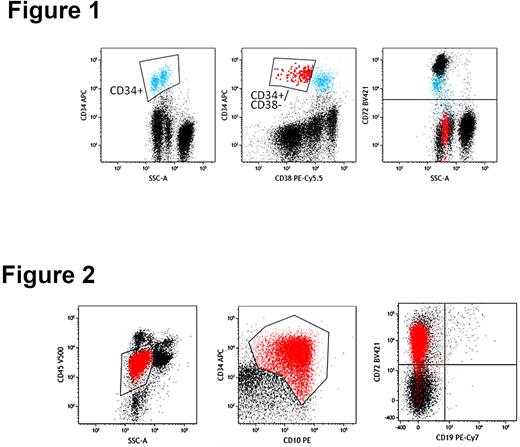Abstract
Immunotherapy has recently gained increasing attention as a new paradigm shift in cancer and has revolutionized the course of cancer treatment. The identification of ideal tumor-associated antigens (TAA) is a challenging process, since antigens have to be specific for the target cells and assure no off-target effects. We exploited a gene expression dataset of acute leukemias previously generated in our lab to identify potentially interesting TAAs. Among the most interesting hyper- and over-expressed genes with respect to normal bone marrow (BM) and with a surface protein localization, the CD72 was selected because of its specific association with childhood B-cell precursor acute lymphoblastic leukemias (BCP-ALL) and with a large proportion of pediatric acute myeloid leukemias (AML) cases. Based on the findings described below, we here propose CD72 as a novel and robust pan-acute leukemia TAA. Even though CD72 is known to be expressed by B-lineage cells, we profiled its expression in a variety of cell lines and primary samples, providing a map of its expression. CD72 was expressed by BCP-ALL cell lines (NALM-6, SEM, RS-4;11, RHC-ACV) and various AML cell lines (SHI-1, SKNO-1, MV4;11, MOML-13). Conversely, T-ALL cell lines (DND-41, TALL-1, RPMI-8402, ALL-SIL, JURKAT) and non-hematopoietic tumor cell lines (DAOY, NB-1, HT-29, A549, HeLa, MCF7) did not express the antigen. This supports the idea that CD72 is specific for hematopoietic tumors. Furthermore, we tested CD72 expression on major populations within normal BM specimens and on other healthy tissues: skin fibroblasts, mesenchymal stromal cells, skeletal myoblasts, endothelial cells. We confirmed that the antigen is expressed on B-lineage cells, whereas in other cell types we did not detect any signal. Then, to assess the interest of CD72 for the development of chimeric antigen receptor (CAR)-based immunotherapy approaches, we documented that CD72 was not expressed on CD34-positive/CD38-negative hematopoietic stem and progenitor cells (HSPCs) from both mobilized peripheral blood cells and healthy-regenerating BM samples (Figure 1). We profiled CD72 expression by flow-cytometry on 289 pathological pediatric BM samples, including: 93 BCP-ALL at diagnosis and 44 at relapse; 38 T-ALL at diagnosis and 3 at relapse; 68 AML at diagnosis and 12 at relapse; blast cells from 6 myelodysplastic syndromes; 14 non-hematopoietic solid tumors invading BM (4 rhabdomyosarcomas, 6 neuroblastomas, 4 Ewing's sarcomas); blast cells from 3 T-cell Lymphoblastic Lymphomas and 8 B-lineage Non-Hodgkin Lymphomas (NHL) with BM involvement. Data from clinical samples confirmed the in silico and in vitro prediction. CD72 was positive in 134/137 (98%) of the examined BCP-ALL cases and in all B-lineage NHL and 52/80 (65%) of AML cases. Conversely, CD72 was expressed only in 2/44 (4%) of T-ALL cases and was absent in T-cell NHL and in non-hematopoietic solid tumors. Notably, CD72 was expressed by all 12 BCP-ALL patients that were previously treated with CD19-directed immunotherapies, including four patients who lost CD19 expression. Moreover, CD72 was positive on two rare cases of CD19-negative BCP-ALL at diagnosis (Figure 2). Within our AML cohort, we did not detect any difference in CD72 expression across AML genetic subgroups. Taken together, the preliminary data here reported highlight the potential clinical usefulness of CD72 for advanced diagnostics, including the ability to identify blast cells in case of CD19 loss, and provide support for developing novel immunotherapy approach directed at CD72 that may be endowed with the unique potential of targeting both acute lymphoid and myeloid leukemia.
Figure 1. CD72 expression by flow-cytometry on healthy CD34+ and CD34+/CD38- cells from healthy-regenerating bone marrow. CD72 expression was evaluated according to AIEOP-BFM Consensus guidelines, comparing the fluorescence shift and distribution pattern of the cells to the appropriate negative control.
Figure 2. CD72 expression on CD19-negative BCP-ALL by flow-cytometry at first diagnosis and at time of relapse after CD19-directed immunotherapy. B-lineage was assigned with the contribution of other antigens relevant in immunophenotyping of acute leukemia.
Disclosures
Rizzardi:Altheia Science: Current Employment. Rizzari:Servier: Consultancy, Honoraria, Research Funding. Locatelli:Miltenyi: Speakers Bureau; BlueBird bio: Speakers Bureau; Medac: Speakers Bureau; Jazz Pharmaceuticals: Honoraria; Amgen: Speakers Bureau; SOBI: Speakers Bureau; Novartis: Honoraria, Speakers Bureau; Neovii: Speakers Bureau. Biffi:Altheia Science: Consultancy. Pigazzi:Altheia Science: Consultancy.
Author notes
Asterisk with author names denotes non-ASH members.


This feature is available to Subscribers Only
Sign In or Create an Account Close Modal